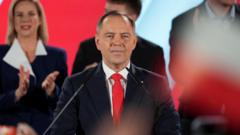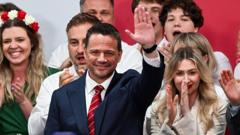With contrasting candidates representing divergent political ideologies, the Polish presidential runoff stands to be a significant indicator of the future of populist movements in Europe, placing pressure on the ruling government of Donald Tusk.
Poland's Presidential Runoff: A Crucial Test for European Populism

Poland's Presidential Runoff: A Crucial Test for European Populism
As Poland prepares for a highly competitive presidential runoff on Sunday, the outcome is set to influence not only the nation's politics but also the broader European landscape of populism.
Article text:
Poland is gearing up for a pivotal presidential runoff this Sunday, with the election drawing intense scrutiny as it showcases competing visions for the country's future. Although the presidency is primarily a ceremonial role, its ability to veto crucial legislation has transformed this election into a critical battleground. Prime Minister Donald Tusk and his centrist Civic Platform party view this election as essential to counteracting the policies of their hard-right predecessors.
As the most populous nation on the eastern edge of the European Union, Poland's political choices resonate far beyond its borders. This runoff is being monitored closely as it may signify whether the tide of populist nationalism is losing momentum across Europe.
The two contenders embody sharply divergent ideologies. At 53 years old, Rafal Trzaskowski, the mayor of Warsaw, represents a liberal stance and connects deeply with urban, progressive voters; he is the offspring of a well-known jazz musician. In contrast, 42-year-old Karol Nawrocki, a newcomer to politics with a background in boxing and historical scholarship, champions a nationalist agenda and aligns himself with the still-influential Law and Justice Party.
With Tusk's backing, Trzaskowski aims to cultivate a collaborative relationship with the current government. Conversely, Nawrocki, with his roots in the previous administration, is expected to utilize the presidency as a tool to challenge and obstruct Tusk’s policies, similar to the outgoing president, Andrzej Duda, who effectively used his veto power against legislative initiatives favored by the centrist coalition.
The stakes are exceptionally high as the final votes are cast, and Poland’s citizens will ultimately determine the direction their country will take amidst rising populist movements that echo across Europe.
Poland is gearing up for a pivotal presidential runoff this Sunday, with the election drawing intense scrutiny as it showcases competing visions for the country's future. Although the presidency is primarily a ceremonial role, its ability to veto crucial legislation has transformed this election into a critical battleground. Prime Minister Donald Tusk and his centrist Civic Platform party view this election as essential to counteracting the policies of their hard-right predecessors.
As the most populous nation on the eastern edge of the European Union, Poland's political choices resonate far beyond its borders. This runoff is being monitored closely as it may signify whether the tide of populist nationalism is losing momentum across Europe.
The two contenders embody sharply divergent ideologies. At 53 years old, Rafal Trzaskowski, the mayor of Warsaw, represents a liberal stance and connects deeply with urban, progressive voters; he is the offspring of a well-known jazz musician. In contrast, 42-year-old Karol Nawrocki, a newcomer to politics with a background in boxing and historical scholarship, champions a nationalist agenda and aligns himself with the still-influential Law and Justice Party.
With Tusk's backing, Trzaskowski aims to cultivate a collaborative relationship with the current government. Conversely, Nawrocki, with his roots in the previous administration, is expected to utilize the presidency as a tool to challenge and obstruct Tusk’s policies, similar to the outgoing president, Andrzej Duda, who effectively used his veto power against legislative initiatives favored by the centrist coalition.
The stakes are exceptionally high as the final votes are cast, and Poland’s citizens will ultimately determine the direction their country will take amidst rising populist movements that echo across Europe.





















